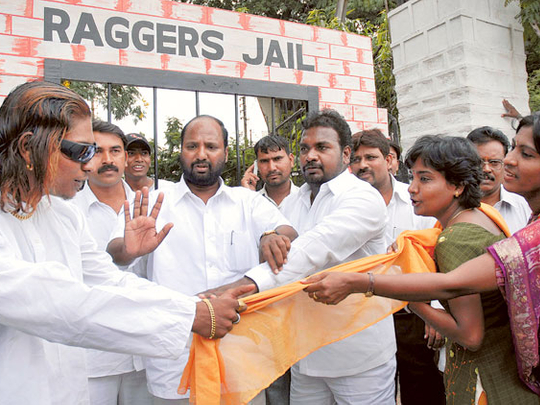
Kolkata: What once was seen as harmless interaction, a ritual featuring healthy banter between seniors and juniors, has now taken sadistic proportions, where fun is sought in acts of utmost wickedness and cruelty.
What has shocked the entire country in the latest hazing-related death is the fact that, even though hazing is a crime generally considered to be confined to the realms of higher education, it has penetrated the school level leading to the demise of a class V student in Kolkata, who was apparently ragged by her seniors studying in class 7-8.
The death of Oindrila Das due to hazing has sent shock waves across the country as parents, teachers and students are still trying to come to terms with the fact that a 10-year-old girl lost her life due the barbaric attitude of her schoolmates.
Reports said the Das been suffering from depression and refused to go to school.
Her father, who initially brushed it aside as normal behaviour of children, took notice when she developed high fever.
“If you consider it as her last statement, she said she was severely beaten and even threatened with dire consequences if she did not bring Rs100 [Dh6] every day for the girls she referred to as didi [sister],” said the victim’s father Santanu Das.
“One day she returned late from school [after she was] apparently rescued from inside a locked bathroom by the sweeper in a quite dismal state,” he added, saying that no father should lose her child under such circumstances.
Dr Kushal Banerjee, co-founder of SAVE (Society Against Violence in Education), said: “Today’s young adults are imitating lot of things that were considered as adult acts even few years ago. The rise in juvenile crime is an indicator of way things have shaped in our society.
Banerjee said complaints of ragging at school level were nothing new.
“What was termed as bullying in earlier times can be termed as ragging as per the definition provided by the Supreme Court of India. Though ragging is generally considered as act of organised crime perpetrated by seniors upon juniors. Cases where co-students have been ragged are not uncommon,” added Banerjee.
Parents, teachers and students of Christ Church are still in a state of dismay over what has unfolded in their school in the last few days.
“Teasing is common, but if it crosses a threshold limit, girls either fight it out or lodge a complaint. But this allegation of extortion is quite strange since the access of senior students to juniors is limited and most importantly no one ever noticed it,” said a student of class X, unwilling to be named.
Teachers at Christ Church said they had no prior information about the incident.
“Believe it or not we had no clue. We came to know about the incident only from the media. Generally, if something goes wrong students only come to us to complaint or inform. But in this case no one had any inkling. But even then we accept our guilt, we should have been more vigilant,” said a teacher of the school who went to visit Oindrila Das’s family.
Like most things, Indian lawmakers had constituted a committee and later formed a law without any implementation, Banerjee said.
“In any institution where there is a hostel, ragging pervades it. Almost 63 per cent of ragging incidents reportedly take place in hostels. But the majority of cases go unreported unless there is death,” added Banerjee.
“Only a collective change in the societal mindset can be the answer, which has to begin with parental guidance. Law alone cannot suffice. After all, nobody can police thousands of colleges and hundreds of universities, except the institutions themselves.”












